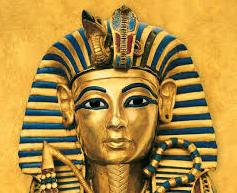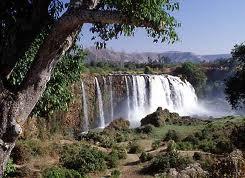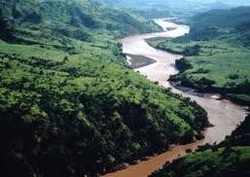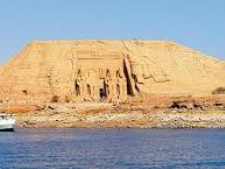 news.nationalgeographic.com
news.nationalgeographic.com The wonders of ancient Egyptian civilization would never have existed without the Nile. I looked into the history of disputes over this life-giving water, which I'll share later.
 www.britanica.com
www.britanica.com State media claim The Great Ethiopian Renaissance Dam, which will be the equivalent of at least six nuclear power plants, is currently under construction to boost power exports.
Egypt and Sudan object, saying the dam violates a colonial-era agreement, which gives them rights to 90% of the Nile's water.
Experts from Ethiopia, Egypt and Sudan are set to announce findings of a study into the impact of the Ethiopian dam on the Nile's flow in the coming weeks. The precious body of water with its fertile yearly deposits has caused a long history of disputes.
 www.andinetusa.org
www.andinetusa.org Sedentary agriculture came to Africa as early as 9000 B.C.E. in the area presently comprising the Sahara Desert. At that time, it was a grassy steppe with many rivers, lakes and streams. The people of the area, originally nomadic, established permanent settlements as early as 7500 B.C.E. and cultivated Sorghum for human and animal consumption. Later they cultivated yams, onions and watermelons and domesticated sheep and goats. By 5000 B.C.E. they organized small monarchies ruled by kings who were considered divine.
Ultimately, climactic changes turned the Saharan area into a desert, and forced its inhabitants to migrate elsewhere. Some settled around existing bodies of water such as Lake Chad. Others moved south into present day Uganda, still others congregated in the valley of the Nile River.
The Egyptian Civilization developed in the delta of the Nile and in small ribbons of land along the banks of the river. The Nile flooded every fall as a result of tropical rains deep in the African continent. The Nile flows south to North, but because it has such a lengthy course (one of the longest in the world) and because it travels through vast desert areas, its origin was unknown for many hundreds of years. The yearly Nile flood deposited a thin layer of rich topsoil on the surface. This annual flooding became the basis for the Egyptian civilization. The soil was so fertile and moist that farmers literally scattered wheat seed into the mud, and it grew, producing a surplus crop. The river was so vital to Egyptian civilization that the Greek historian Herodotus called it the "Gift of the Nile."
Aside from its annual flood, the Nile was a calm river, easily navigated, at least near its Delta. This made transportation easy, and helped the people of Egypt unite into a single kingdom. They were able to stay in close contact with one another. Upstream, a series of cataracts made the Nile virtually un-navigable, which protected the Egyptians from invasion by people living upstream. In addition to the Nile, Egypt had a rich store of stone for building, clay for pottery, gold for jewelry and ornaments. Copper was nearby in the Sinai Peninsula; and cedar could be obtained from Lebanon, both close by. This made the Empire virtually self-sufficient.
Egypt profile, sourced from the BBC:
circa 7000 BC - Settlement of Nile Valley begins.
circa 3000 BC - Kingdoms of Upper and Lower Egypt unite. Successive dynasties witness flourishing trade, prosperity and the development of great cultural traditions. Writing, including hieroglyphics, is used as an instrument of state. Construction of the pyramids - around 2,500 BC - is a formidable engineering achievement.
669 BC - Assyrians from Mesopotamia conquer and rule Egypt.
525 BC - Persian conquest.
332 BC - Alexander the Great, of ancient Macedonia, conquers Egypt, founds Alexandria. A Macedonian dynasty rules until 31 BC.
31 BC - Egypt comes under Roman rule; Queen Cleopatra commits suicide after Octavian's army defeats her forces.
642 AD - Arab conquest of Egypt.
969 - Cairo established as capital.
1250-1517 - Mameluke (slave soldier) rule, characterized by great prosperity and well-ordered civic institutions.
1517 - Egypt absorbed into the Turkish Ottoman empire.
1798 - Napoleon Bonaparte's forces invade but are repelled by the British and the Turks in 1801. Egypt once more becomes part of the Ottoman empire.
1859-69 - Suez Canal built.
1882 - British troops take control of Egypt.
1914 - Egypt becomes a British protectorate.
1922 - Fuad I becomes King of Egypt and Egypt gains its independence. ...


 RSS Feed
RSS Feed






